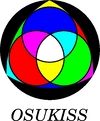Friday, October 26 2018 |
|
|
| Once you have booted from a LIVE osukiss install (USB or PXE) you
|
| are prompted with a dialog screen with 4 options
|
|
|
| Keys (Set system keyboard)
|
| Inst (Install system)
|
| Shell (Rescue system)
|
| Shutdown (Poweroff system)
|
|
|
|
|
| Select "Inst"
|
|
|
| Disk Partitionning:
|
| First you need to select on which disk you want install Osukiss,
|
| The installer script will create partition on all disks listed and setup a
|
| sofware RAID (mdadm: raid1, and raid10) if you have selected more
|
| than one disk (disk size must be roughly equal to have raid happy).
|
| In RAID mode, MBR record are written on all Raid disks that are assigned
|
| to osukiss, so rebooting shouldn't be a problem.
|
| Caution:
|
| validations are prompted before using a disk because install
|
| procedure use the whole disk to install Osukiss.
|
|
|
| Program Install
|
| Once the disk is ready, another dialog window will appeare and
|
| ask you to select program components.
|
|
|
| [ ] release-minimal
|
| [ ] release-base
|
| [ ] release-server
|
| [ ] release-devel
|
| [ ] release-xorg
|
| [ ] release-lxqt
|
| [ ] release-xfce
|
| [ ] release-applications
|
| [ ] release-games
|
|
|
|
|
| Minimal is the very minimal set of programm to have a bootable Osukiss.
|
| Server is all component needed to have a server (postgresql,mariadb,bin,ntp)
|
| Devel is all component needed to build application (compiler, make, etc....)
|
| Xorg regroup the basic graphic components
|
| LXQT regroup component for lxqt desktop display
|
| XFCE regroup component for lxqt desktop display
|
| Applications regroup application components (web browser, accounting, video transcoder)
|
| Games!, just two for now,
|
| bzflag. Purpose of this games is to show 3D and sound handling.
|
| swell-foop, a puzzle game.
|
|
|
| We suggest to select only release-minimal the first time.
|
| Around 130 packages are to be installed and process will be displayed on screen.
|
|
|
| Once installation completed, you will be asked to set the root password and
|
| to create, at least, one user.
|
| Once all needed users are created, just select within dialog window.
|
|
|
| Once completed, you can do "chroot /osukiss" to double check installation
|
| and check if you find your mark within.
|
|
|
| Now reboot and remove the USB-key, Osukiss should come up nicely
|
|
|
|
|
| Once rebooted, you can type:
|
| # yum list | grep release
|
| and see a list of release (release-xxx are set of packages)
|
|
|
| If you want graphic, type;
|
|
|
| # yum install release-applications release-games
|
| yum will ask you for a "go/nogo" to install +200 packages is ok, say "y"
|
|
|
| You can now, activate the graphic mode, by typing
|
| # /sbin/init 5
|
|
|
| To check if everything is alright, you can switch back to command line
|
| mode
|
| # CTRL+ALT+F1
|
| and come back to console mode by typing
|
| # /sbin/init 3
|
|
|
| Once you are satisfied, change file
|
| /etc/inittab
|
| to set '5' instead of '3' as initdefault mode (inittab first line)
|
|
|
| Reboot and enjoy.
|
